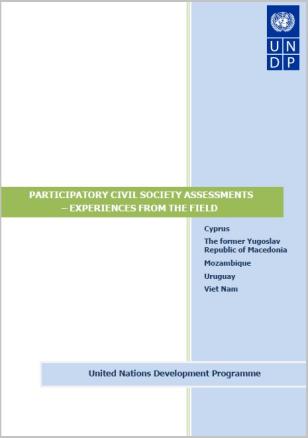Participatory Civil Society Assessments: Experiences from the Field

English
DownloadParticipatory Civil Society Assessments: Experiences from the Field
October 28, 2015
Participatory Civil Society Assessments: Experiences from the Field (2011) documents and analyzes the experiences of five UNDP Country Offices and civil society partners in Cyprus, the former Yugoslav Republic of Macedonia, Mozambique, Viet Nam, and Uruguay, in implementing the CIVICUS Civil Society Index (CSI) since 2005-2006.
Even though the CSI has been most effective in developing the capacity of the actors positioned within the immediate radius of the project, these experiences suggest that a process such as the CSI can lend itself to broader capacity development initiatives if undertaken in a purposeful and facilitated way. These case studies show evidence of the creation of joint civil society – UNDP programmes in all five countries studied as a direct output of the process. Cyprus used the results of the CSI to develop a comprehensive civil society programme, aimed at promoting civic engagement throughout the country. The Mozambican, Macedonian and Uruguayan case studies report capacity-development initiatives for civil society in the area of social accountability e.g., conducting training on participatory budgeting, public expenditure tracking and citizen report cards, in response to gaps identified in the CSI process. These initiatives foster inclusive participation and engagement of citizens in national and local decision-making processes aimed at holding the state accountable.
Finally, the report points out that the next generation of participatory civil society assessments needs to build on the fact that genuine civil society infrastructure emerges indigenously. External drivers can influence and shape this process, but initiatives are unlikely to last without successful adaptation to local context and realities, and an ability to effectively foster action for development results.

 Locations
Locations